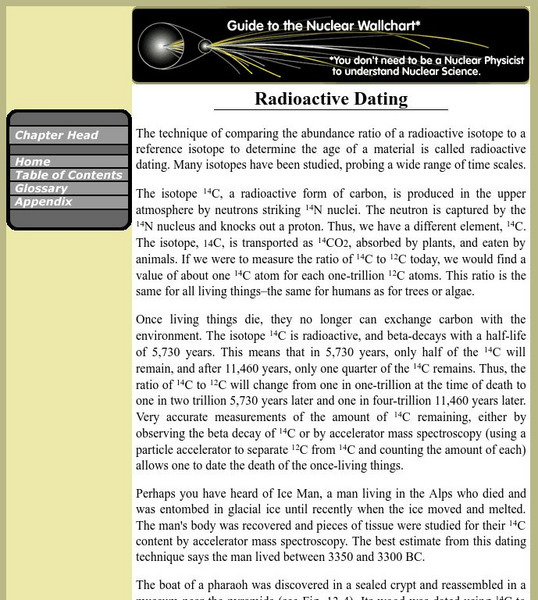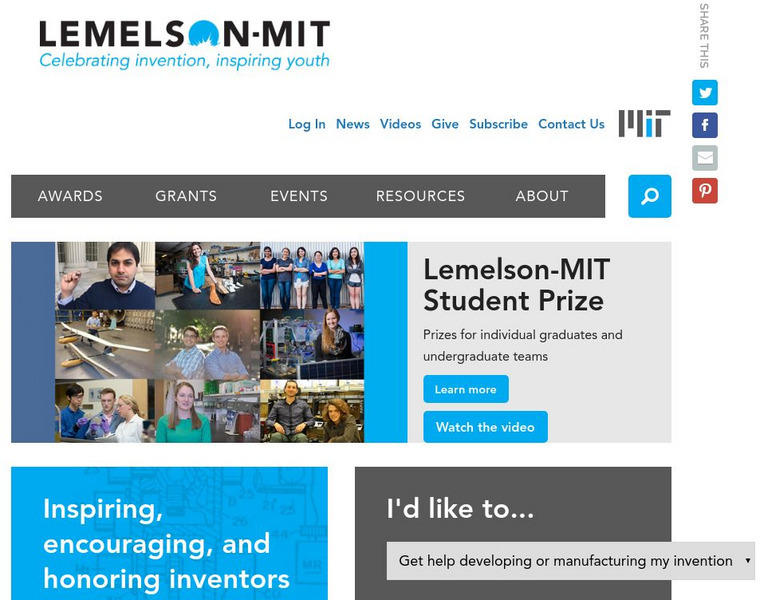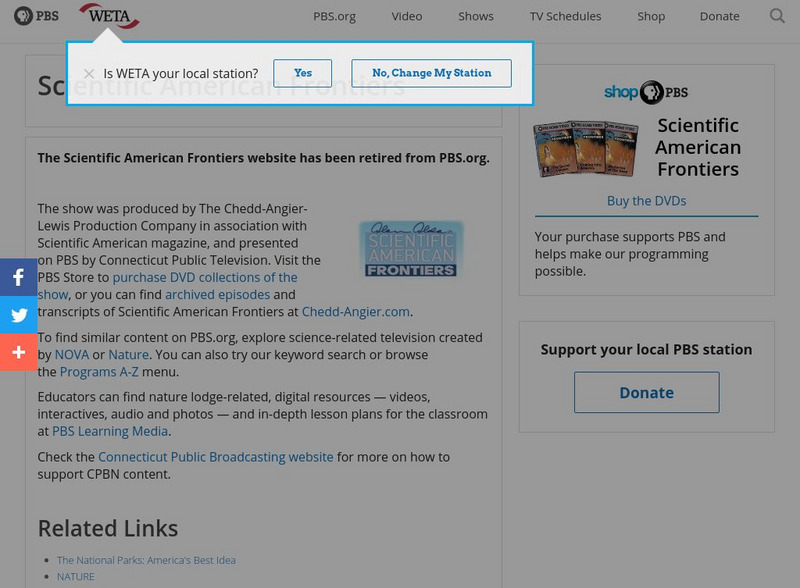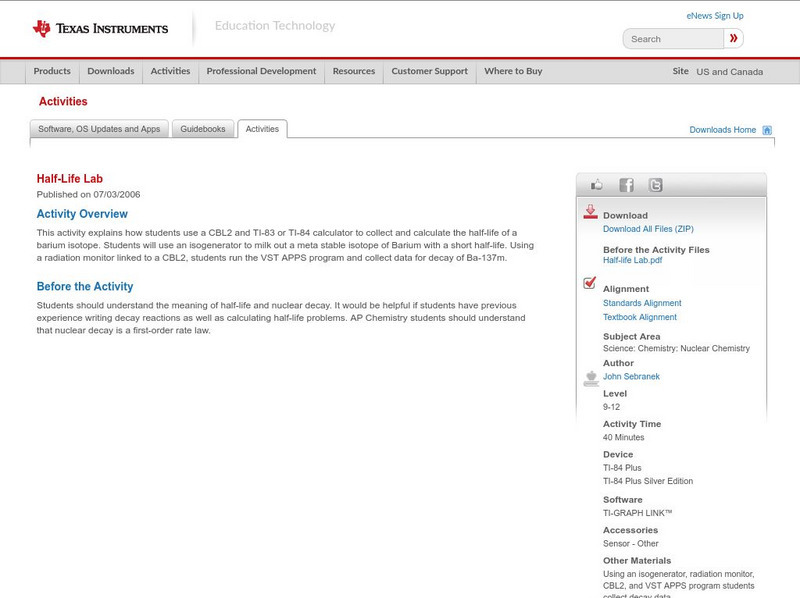Hi, what do you want to do?
Curated OER
To Renew, or Not to Renew
Students explore the various types of renewable energy. After reading articles, they discover the advantages and disadvantages of renewable energy. They also explore the challenges to switch over to using more and more renewable energy...
Curated OER
Excavating the Past
Young scholars discover how palaeontologists conduct a dig for fossils and how they interpret the age of the fossils. In small groups, they prepare a "dig site" consisting of bones, rocks and soil layered in a cardboard box. They switch...
Curated OER
Polishing the Petoskey
Students select a stone and polish it. Throughout the process they demonstrate an understanding of rocks and fossil formation.
Curated OER
Air Pollution Over Where?
Learners predict the movement of an air borne pollutant using their understanding of air currents. They determine which governments and/or communities should be contacted to be forewarned. They also explore the properties of their...
Curated OER
Chemical Calculations and Chemical Formulas
In this stoichiometry worksheet, learners calculate molar masses, empirical and molecular formulas to solve 105 problems and short answer questions.
Curated OER
Reactor Incident
Students are introduced to Chernobyl incident and the resulting environmental health impacts they watch a PowerPoint presentation, read articles and discuss what they have gained from these sources.
Science Struck
Science Struck: Isotopes of Carbon
Describes the characteristics of carbon and what an isotope is. Presents a chart of carbon isotopes listing nuclide symbol, atomic weight, half-life, and nuclear spin, as well as a second chart listing radioactive carbon isotopes....
Khan Academy
Khan Academy: Understanding the Properties of Radioactive Tracers
Read the passage and study the graphic to complete the five-question quiz about the properties of radioactive tracers.
BBC
Bbc: Gcse Bitesize: Radioactive Emissions
This lesson focuses on radioactive emissions including radioactive decay, half-life, using half-life, how to calculate net decline, a table showing how the count rate of an isotope might change over time, and a link to a test.
Science Education Resource Center at Carleton College
Serc: Radioactive Dating: Looking at Half Lives Using M&ms
In this activity, students gain a better understanding of radioactive dating and half-lives by using M&Ms to demonstrate the idea of radioactive decay. They will be able to see how scientists can determine the age of rocks by looking...
Lawrence Berkeley National Laboratory
Berkeley Lab: Radioactive Dating
This site provides an overview of radioactive dating, a process used to determine the age of rocks and other materials.
Texas Instruments
Texas Instruments: Numb3 Rs: A Matter of Half Life and Death
Based off of the hit television show NUMB3RS, this lesson introduces students to the topic of exponential decay and half-life. The lesson is built around Cesium-137, a radioactive isotope, and it's declining radioactivity over the course...
Massachusetts Institute of Technology
Mit: Inventor of the Week: Willard Libby Carbon Dating
Use this site to learn about radiocarbon dating and the scientist who discovered it, Willard Libby (1908-1980 CE).
PBS
Pbs Teachers:nordic Sagas: Radioactive Reindeer
Demonstrate how soil absorbs radioactivity by simulating the absorption of the radioactive isotope from the Chernobyl disaster into the lichen of Scandinavia. Use a chart to figure out the half-life of the isotope.
Science Education Resource Center at Carleton College
Serc: Radioactive Decay Calculator
Students will use this online Radioactive Decay Calculator to compute radioactive decay, timed decay, and timed solid disposal for a databank containing 116 isotopes. This calculator also features University of British Columbia disposal...
Encyclopedia of Earth
Encyclopedia of Earth: Uranium
Information about the radioactive element, Uranium, atomic number 92. Describes its history, physical and atomic properties, how abundant it is on the Earth, and permissible exposure limits. Also discusses sources, uses, isotopes,...
US Geological Survey
The Numeric Time Scale
This is a good source for getting an in-depth description of using radioactive decay to measure the ages of rocks. In addition to describing the process of radiometric dating, this resource also includes a geologic time scale and four...
Georgia Department of Education
Ga Virtual Learning: Historical Geology
In this interactive tutorial you will explore how geologists use clues in rocks to determine the order in which rocks formed. Learn how principles of radioactivity are used to assign actual ages to rocks. Students will explore fossils...
Texas Instruments
Texas Instruments: Half Life Lab
This activity explains how students use a CBL2 and TI-83 or TI-84 calculator to collect and calculate the half-life of a barium isotope. Students can use an isogenerator to milk out a meta stable isotope of Barium with a short half-life....
PBS
Pbs Teachers: Coming Into America: Dating Artifacts 9 12 [Pdf]
Investigate new discussions on the presence of humans in North America, and emulate the work of archeologists in dating artifacts at a dig site. Use clay to model how the radioactive isotope of carbon (C14) is used in dating organic...
























![Pbs Teachers: Coming Into America: Dating Artifacts 9 12 [Pdf] Unit Plan Pbs Teachers: Coming Into America: Dating Artifacts 9 12 [Pdf] Unit Plan](https://content.lessonplanet.com/knovation/original/120529-1fff0a46b8b0ffc6cda465ec2fb4d28e.jpg?1661418872)